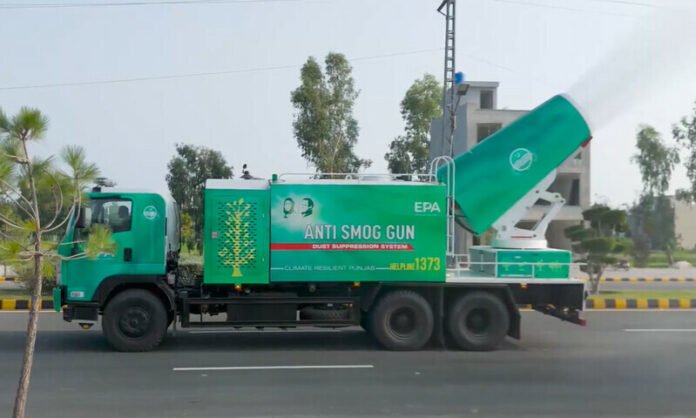In a landmark environmental initiative, Lahore has become the first city in the world to deploy AI-powered Anti‑Smog Fog Cannon Systems in its battle against dangerous levels of air pollution. The project, spearheaded by Punjab Chief Minister Maryam Nawaz Sharif, has seen the arrival of fifteen high-tech fog cannon units aimed at improving urban air quality before the onset of the winter smog season.
These advanced machines work by spraying a fine mist into the air, which binds with harmful particulate matter such as PM2.5 and PM10. The mist helps bring the particles down to ground level, thereby cleaning the surrounding air. The initiative is being hailed as a major step toward modernizing Pakistan’s approach to environmental protection.
What sets these anti-smog units apart is their smart integration with Lahore’s existing air quality monitoring systems. Equipped with real-time data tracking, satellite imagery, drone surveillance, and AI algorithms, the cannons can automatically activate in high-pollution zones. This adaptive technology ensures that polluted areas receive immediate attention, maximizing efficiency and impact.
The system also links with QR-code-based tracking for brick kilns—one of the major contributors to smog in the region—ensuring a comprehensive approach to pollution control. Oversight will be handled by the Environment Protection Force, which has been tasked with ensuring proper usage, deployment, and maintenance of the fog cannons.
Chief Minister Maryam Nawaz described the launch as a “revolution in environmental enforcement,” emphasizing that technology and innovation must lead the fight against smog and its damaging effects on public health. She further noted that this step is part of a broader environmental vision that combines high-tech solutions with public engagement to build a healthier, cleaner Pakistan.
This innovation builds upon earlier trials involving anti-smog towers in Lahore, particularly at pollution-heavy sites like Mehmood Booti. Those towers, which used electrostatic charge technology to filter up to 50,000 cubic meters of air per hour, laid the groundwork for the introduction of more advanced and mobile systems like the fog cannons.
With this new deployment, Lahore is now being recognized as a pioneer in smart anti-smog infrastructure. Officials have confirmed that results will be closely monitored over the coming weeks, and if the impact proves significant, the program will be expanded to other high-risk urban zones across Punjab. This marks a bold new chapter in Pakistan’s environmental strategy—where artificial intelligence, data analytics, and modern engineering converge to protect public health and restore the quality of the air in one of South Asia’s most polluted cities.
























